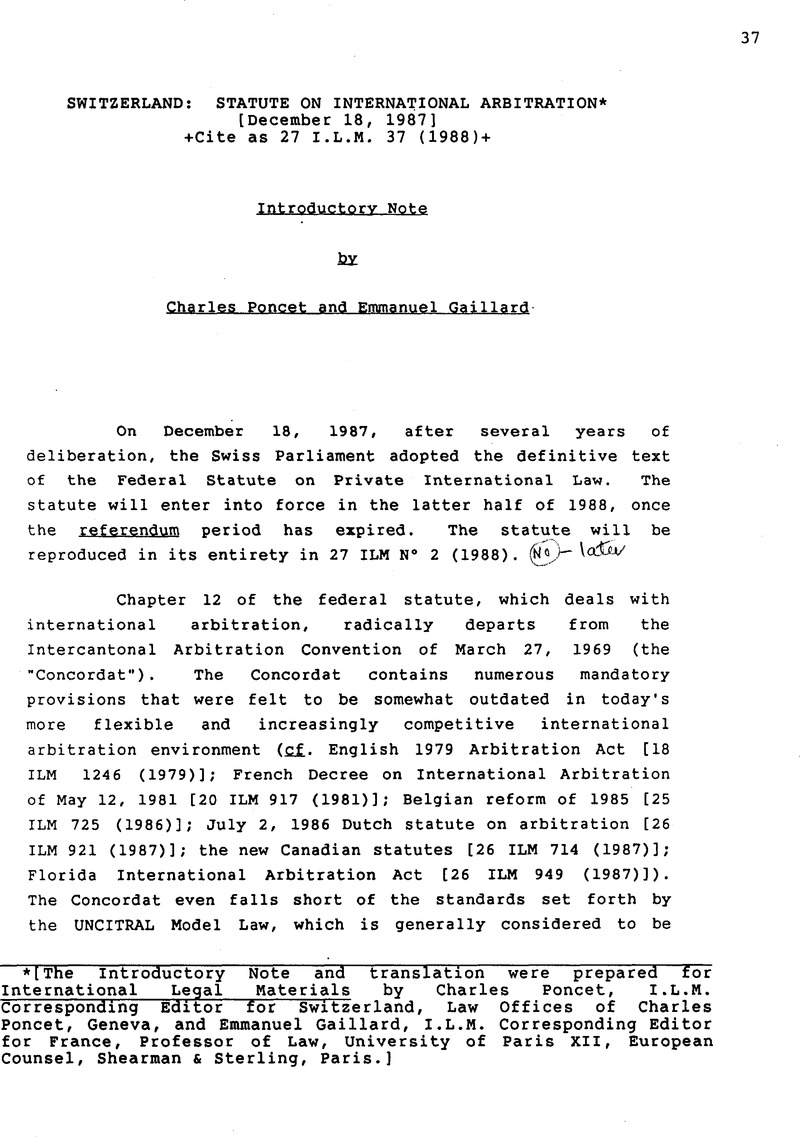No CrossRef data available.
Published online by Cambridge University Press: 27 February 2017

* [The Introductory Note and translation were prepared for International Legal Materials by Charles Poncet, I.L.M. Corresponding Editor for Switzerland, Law Offices of Charles Poncet, Geneva, and Emmanuel Gaillard, I.L.M. Corresponding Editor for France, Professor of Law, University of Paris XII, European Counsel, Shearman & Sterling, Paris.]
(1) The French text refers to “toute cause de nature patrimoniale”, the German text, to “jeder vermogensrechtliche Anspruch”. The concept of “patrimoine” is particularly broad, encompassing all kinds of rights and liabilities. Accordingly, all types of claims, whether contractual, tortious, commercial or financial, are arbitrable.
(2) The German version adds “… within the scope of the arbitration agreement.” (“… die Gegenstand der Schiedsvereinbarung ist.”)
(3) The French version opposes the formal requirements of 178(1)(“… Quant a la forme …”) to the substantive requirements of 178(2)(“ … Quant au fond …”). The German version simply adds “moreover” (“im ubrigen”) to the formal requirement of 178(1).
(4) In French,“… juge du siege du tribunal arbitral …”in German,“… Richter am Sitz des Schiedsgerichts …”
(5) The German text says “sinngemass”, i.e., “according to its meaning”.
(6) In French, “saisit le ou les arbitres”.
(7) The French text refers to the “competent” court, i.e., one having proper jurisdiction.
(8) InGerman, French, preuves.“ …nimmt die Beweise selber ab.”; in procede lui-meme a 1'administration des
(9) The German text “… so ist der Richter am Sitz des schiedsgerichts zustandig” is more precise than the French “… on requerra le concours du juge du siege …”
(10) “En general"; “… in der Regel”.
(11) “… durch Vorentscheid”;“… par une decision incidente”, as opposed to an award on the merits.
(12) ( In French,“statuer en equite”; in German, “nach Billigkeit”
(13) “Teilentscheide”, or “sentences partielles”, as opposed to “Schiedsentscheid” or “sentence arbitrale” at 189.
(14) This means that the parties may, among other things, waive the requirement at 189(2) that reasons must be given.
(15) In French, “recours”; in German, “Beschwerde”.
(16) In German, “vorschriftswidrig“; in French, ”irregulieremenf.
(17) The German “Rechtsbegehren” suggests legal issues, whereas the French H un des… chefs de la demande … M , is somewhat broader.
(18) The Federal Tribunal is the highest court in Switzerland.
(19) One possible recourse to the Federal Tribunal which excludes oral arguments and, generally, disposes of cases reasonably efficiently.
(20) Loi federale d'organisation judiciaire; Bundesgesetz liber die Organisation der Bundesrechtspflege.
(21) See supra, note 4.
(22) Meaning no subsequent appeal to the Supreme Court under any circumstances.
(23) See supra, note 5.